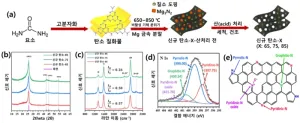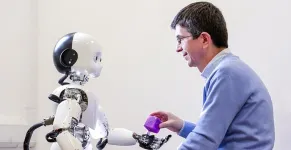Development of an artificial kidney for early detection of drug toxicity
2023-03-31
(Press-News.org)
The kidney plays a vital role in maintaining homeostasis within the body by eliminating toxic and superfluous substances in the bloodstream, including waste generated during metabolic processes, through urine. Nevertheless, toxicity can also be induced in the kidney from certain medications. Recently, a research team from POSTECH has engineered an artificial kidney that allows for the early detection of adverse drug reactions.
The POSTECH research team led by Professor Dong-Woo Cho and Professor Jinah Jang (Department of Mechanical Engineering) fabricated a glomerular microvessel-on-a-chip, which includes glomerular endothelial cells, podocyte layers, and a glomerular basement membrane (GBM) using a single step fabrication process. The research findings have been published in the esteemed journal, Biofabrication.
Nephron is the fundamental structural and functional unit in the kidney. It encompasses a network of small blood vessels called the glomerulus, twisted into a convoluted thread-like shape, contributing to forming kidney corpuscle along with glomerular capsules. It also plays a role in removing waste from the blood. When an excessive quantity of drugs is administered, the nephron is often the first organ to exhibit drug toxicity in the body.
Given this challenge, efforts have been directed toward the development of artificial organs that can determine the degree of toxicity induced by specific drug concentrations and combinations before actual drug administration. However, it should be noted that the glomerulus is responsible not only for regulating endothelial cells but for selectively releasing proteins. This function requires interactions of podocytes and GBM proteins and is executed at a microscopic scale, making its emulation difficult.
The team successfully fabricated a glomerular microvessel-on-a-chip that recapitulates the intricate arrangement of the glomerular endothelial cells, podocyte layers, and GBM in a single step. This perfusable chip permits the co-culture of monolayer glomerular endothelium and podocyte epithelium, which demonstrate mature functional markers of glomerular cells. Moreover, the proper interactions between these cells lead to the production of GBM proteins, the key components of the GBM in vivo. Additionally, the team assessed the selective permeability capacity, a hallmark function of the glomerular filtration barrier in this novel glomerular model as well as evaluated the response of this model to Adriamycin- and hyperglycemia-induced injury.
“We have successfully replicated glomerular units of the kidney, which offer boundless potential for drug screening and nephrotoxicity testing in clinical practice,” explained Professor Dong-Woo Cho who led the study. He added, “This development will enable us to detect drug toxicity early by facilitating glomerulus disease modeling and to provide personalized treatment for patients.”
The study was supported by the Korean Fund for Regenerative Medicine funded by Ministry of Science and ICT of Korea and by the Alchemist Project.
END
ELSE PRESS RELEASES FROM THIS DATE:
2023-03-31
Overview
A research team, led by Professor Yuji Nakamura of the Department of Mechanical Engineering at Toyohashi University of Technology, discovered that the flickering of flames can be freely controlled by moving two flames closer together or further apart. Until now, it had been known that interference between flames separated by a certain distance causes the flames to flicker during in-phase or anti-phase. However, it was not possible to stably express the state of “stopping the flickering of flames” that should occur under critical ...
2023-03-31
□ DGIST Professor Yoonkyu Lee’s research team illuminated intense light on the surface of a copper wire to synthesize graphene, thereby increasing the production rate and lowering the production cost of the high-quality transparent-flexible electrode materials and consequently enabling its mass production. This technology is applicable to various 2D materials[1], and its applicability can be extended to the synthesis of various metal-2D material nanowires.
□ The research team used copper-graphene nanowires to implement high-performance transparent-flexible ...
2023-03-31
□ On February 16 (Thursday), the DGIST held a graduation ceremony for the first half of 2023, that is, those who graduated in February, at the Convention Hall in the Office of the University. A total of 242 students—29 doctoral, 87 master’s, and 126 bachelor’s students—received academic degrees in science and technology fields.
□ Jongho Lee (Minister of Science and ICT), Junghye Noh (the board chairman of DGIST and an honorary professor at SNU), Jonghan Kim (the administrative mayor of Daegu Metropolitan City), ...
2023-03-31
□ The research team led by Professor Minseok Kim from the Department of New Biology at DGIST (President Yang Kuk) has developed a technology that can treat Charcot-Marie-Tooth (CMT) disease, an incurable hereditary disease, with electric stimulation instead of drug therapy. The core of this technology is electric stimulation that restores the abnormal distribution of peripheral myelin protein 22 (PMP 22)[1], the cause of the disease, to normal. The research team discovered it by conducting a series of electric stimulation experiments using a CMT disease subtype ...
2023-03-31
□ The research team led by Professor Hongsoo Choi from DGIST (President Kuk Yang) in the Department of Robotics and Mechatronics Engineering has developed a microrobot capable of forming neural networks and sectioning hippocampal tissues in an in vitro environment in an ex vivo[1] state. Through the joint research with the team led by Dr. Jongcheol Rah from Korea Brain Research Institute, the possibility of analyzing structurally and functionally connected neural networks using a microrobot in an in-vitro environment during cell delivery and transplantation has been confirmed. The research findings are ...
2023-03-31
□ DGIST (President Kuk Yang) announced on March 7, 2023, that student startups, CURE and TIA, received the Grand Prize and Excellence Award, respectively, in the “LAB Start-up 2023” which is sponsored by the Ministry of Science and ICT and supervised by Commercialization Promotion Agency for R&D Outcome (COMPA) and Korea Entrepreneurship Foundation.
□ This event, which was held under the theme of "Scientific Technology, the Advocate of Entrepreneurship," involved IR and exhibitions of 146 teams that have been challenged to start a business through the ...
2023-03-31
□ The research team led by Professor Jong-Sung Yu of the Department of Energy Science and Engineering at DGIST (President Kook Yang) has developed a low-temperature method to synthesize a highly graphitized[1] carbon support[2] that will greatly improve the lifespan of hydrogen fuel-cells[3]. They expect that the results of this study will greatly increase the possibility of commercialization by being used in fuel cells for vehicles, batteries for water electrolysis, and drones.
□ The importance of hydrogen fuel-cells is increasing with the burgeoning need for eco-friendly energy. Therefore, studies to improve the performance and lifespan of hydrogen fuel-cells ...
2023-03-31
The University of Warwick is proud to stand with neurodiverse communities during Autism Awareness Month. This month, the University aims to raise autism awareness and acceptance, while celebrating the diversity of all individuals that make up the University of Warwick community. According to the National Autistic Society, there are around 700,000 autistic people in the UK.
As part of ongoing research into the best way to support neurodiverse individuals, academics at the Centre for Educational Development, Appraisal and Research (CEDAR) are launching two clinical trials and are encouraging autistic adults to consider ...
2023-03-31
A team of experts at The University of Manchester has been awarded major funding to help design smarter robots that will have more meaningfully dialogue with humans after developing improved insight into our inner feelings through language.
The European Research Council (ERC) has awarded Professor Angelo Cangelosi, co-director of the Manchester Centre for Robotics and AI, a total of €2.5million as part of the eTALK project.
The Manchester research team will combine expertise in AI ...
2023-03-31
Latinx children in the US experienced higher rates of depression and anxiety during the Covid-19 pandemic, a new study shows, as experts state the “pressing need” to examine the long-term impact.
Findings, published today in the peer-reviewed Journal of Clinical Child & Adolescent Psychology, follow the examination of early adolescent school data from the first two years of the pandemic, compared to pre-pandemic levels.
The results show Latinx students were 1.5 to 2 times more likely to present with risk for both depression and anxiety during every academic year cohort assessed.
The highest maladjustment was found among Latinx girls and gender non-conforming/binary ...
LAST 30 PRESS RELEASES:
[Press-News.org] Development of an artificial kidney for early detection of drug toxicity







